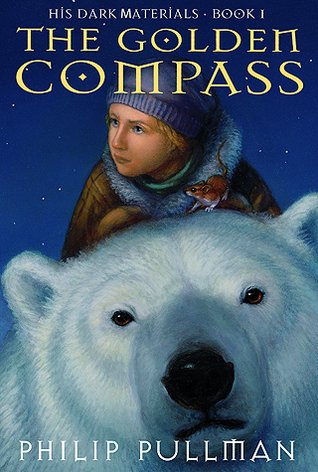
The Golden Compass (His Dark Materials, Bk. 1)
by Philip Pullman
Buy on Amazon
I went into this book with reviews of the movie based upon the book still fresh in my memory, protests by religious groups that the book itself was a condemnation of the Catholic Church and critiques by various magazines to back them up. I didn’t come to that conclusion, however, when reading The Golden Compass. I believe that calling the book a condemnation of the Catholic Church is far too limiting. From what I read, the book was a condemnation of most traditional institutions of authority.
The novel centers around the adventures of a girl named Lyra and her daemon Pantalaimon (essentially her soul, tethered to her by a psychic cord) and her journey to find her father and uncover a conspiracy to kill the souls of children in order to glean more knowledge about Dust (which is pretty much a McGuffin, because the nature of Dust is never explained). That the conspiracy is headed up by the government, which is, in Lyra’s world, a theocracy based rather heavily on the Anglican/Catholic Church, covers the condemnation of organized religion that critics of the books and movies are all up in arms about.
However, there is far more subtle oppression that the book condemns. To begin, Lyra is first the resident of Jordan College, where her presence is at most tolerated. Her schooling is minimal, and her teachers are just as likely to beat her as give her lessons. The school functions as a means of control. It controls her schedule, as she must return home by certain times, or be beaten, it controls her borders, as she can’t go too far, or risk beatings. While this seems like a regular imposing of discipline on an unruly child, considering that Lyra is constantly getting into trouble, I believe that the time-frame this book was written in is important. In 1995, when the book was first published, corporal punishment for a child was considered by the majority of societies to be cruel. That child are so casually beaten by authority figures in Lyra’s Oxford should, I believe, be taken note of.
The greatest abuse and condemnation of authority goes the the largest traditional authority figures in a child’s life: the parents. In The Golden Compass, Lyra’s parents are revealed to be Lord Asriel and Mrs. Coulter (as in the beginning, Lyra is thought to be an orphan), the true villains of the piece. Coulter and Asriel’s abuse however, is not physical, but rather spiritual, as they are revealed to be responsible for the murder of children’s souls for the sake of scientific and religious research. Mrs. Coulter is shown to be the head of the General Oblation Board, which kidnaps children to harvest their souls, while Asriel, who for most of the book is seen as an idealized hero by Lyra, betrays his daughter by murdering the soul of her friend right in front of her, and then shares a long kiss with Mrs. Coulter at their shared victory (in a sort of twisted vision of an orphan’s fantasy of being reunited with their parents).
There is also the idealizing of non-authority figures in the piece, namely social outcasts. Those who give Lyra the most help and save her on multiple occasions are gypsies, witches, murderers, criminals, exiles, and foreigners. While authority figures are seen as abusive and controlling, the outcasts are welcoming and forgiving, even those who Lyra has hurt in the past (particularly the gypsies). Outcasts put their lives on the line for Lyra’s survival, or sometimes even her convenience.
If it weren’t for the killing of children’s souls, it would be difficult to sympathize with Lyra considering how ill-behaved she is. However, that one abhorrent act, and that figures of authority perform it so freely with only the barest of rationalizations makes it impossible to sympathize with them (which is another reason why I believe the series fails as a whole because after the first book, it concentrates primarily on Lyra, who does not change, and has no grand and terrible regime to rebel against to balance her dubious morality). Thus, through either actively participating or silently consenting, the institutions of traditional authority are vilified in The Golden Compass, not just the Church.
I haven't seen or read it, but based on your review, it sounds like a great book. I have a small critique on your protagonist view I just really want to share.
We're all used to hero snowflakes staring the plots. Above average people who, as you stated it yourself, evolve. But people usually aren't like that.
The way this book depicts a common person in it's world who decides to pursue a goal is very intriguing to me, so much that I now plan pick it up just to see how it develops.
Thank you for the review!
Downvoting a post can decrease pending rewards and make it less visible. Common reasons:
Submit
Oh I love The Golden Compass and the rest of the series! Thanks for the post.
Downvoting a post can decrease pending rewards and make it less visible. Common reasons:
Submit